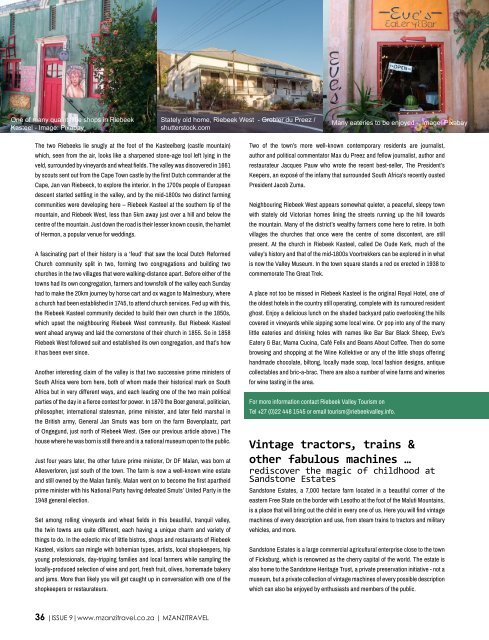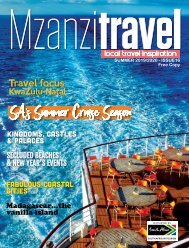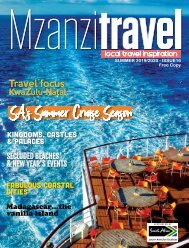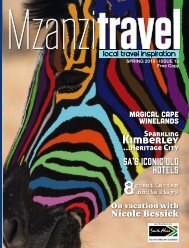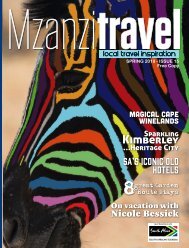Mzanzitravel Magazine - Issue 9
MzanziTravel Magazine is a local travel inspiration for tourists (local and international) to discover the best places to visit in Africa.
MzanziTravel Magazine is a local travel inspiration for tourists (local and international) to discover the best places to visit in Africa.
You also want an ePaper? Increase the reach of your titles
YUMPU automatically turns print PDFs into web optimized ePapers that Google loves.
One of many quaint little shops in Riebeek<br />
Kasteel - Image: Pixabay<br />
Stately old home, Riebeek West - Grobler du Preez /<br />
shutterstock.com<br />
Many eateries to be enjoyed - Image: Pixabay<br />
The two Riebeeks lie snugly at the foot of the Kasteelberg (castle mountain)<br />
which, seen from the air, looks like a sharpened stone-age tool left lying in the<br />
veld, surrounded by vineyards and wheat fields. The valley was discovered in 1661<br />
by scouts sent out from the Cape Town castle by the first Dutch commander at the<br />
Cape, Jan van Riebeeck, to explore the interior. In the 1700s people of European<br />
descent started settling in the valley, and by the mid-1800s two distinct farming<br />
communities were developing here – Riebeek Kasteel at the southern tip of the<br />
mountain, and Riebeek West, less than 5km away just over a hill and below the<br />
centre of the mountain. Just down the road is their lesser known cousin, the hamlet<br />
of Hermon, a popular venue for weddings.<br />
A fascinating part of their history is a ‘feud’ that saw the local Dutch Reformed<br />
Church community split in two, forming two congregations and building two<br />
churches in the two villages that were walking-distance apart. Before either of the<br />
towns had its own congregation, farmers and townsfolk of the valley each Sunday<br />
had to make the 20km journey by horse cart and ox wagon to Malmesbury, where<br />
a church had been established in 1745, to attend church services. Fed up with this,<br />
the Riebeek Kasteel community decided to build their own church in the 1850s,<br />
which upset the neighbouring Riebeek West community. But Riebeek Kasteel<br />
went ahead anyway and laid the cornerstone of their church in 1855. So in 1858<br />
Riebeek West followed suit and established its own congregation, and that’s how<br />
it has been ever since.<br />
Another interesting claim of the valley is that two successive prime ministers of<br />
South Africa were born here, both of whom made their historical mark on South<br />
Africa but in very different ways, and each leading one of the two main political<br />
parties of the day in a fierce contest for power. In 1870 the Boer general, politician,<br />
philosopher, international statesman, prime minister, and later field marshal in<br />
the British army, General Jan Smuts was born on the farm Bovenplaatz, part<br />
of Ongegund, just north of Riebeek West. (See our previous article above.) The<br />
house where he was born is still there and is a national museum open to the public.<br />
Just four years later, the other future prime minister, Dr DF Malan, was born at<br />
Allesverloren, just south of the town. The farm is now a well-known wine estate<br />
and still owned by the Malan family. Malan went on to become the first apartheid<br />
prime minister with his National Party having defeated Smuts’ United Party in the<br />
1948 general election.<br />
Set among rolling vineyards and wheat fields in this beautiful, tranquil valley,<br />
the twin towns are quite different, each having a unique charm and variety of<br />
things to do. In the eclectic mix of little bistros, shops and restaurants of Riebeek<br />
Kasteel, visitors can mingle with bohemian types, artists, local shopkeepers, hip<br />
young professionals, day-tripping families and local farmers while sampling the<br />
locally-produced selection of wine and port, fresh fruit, olives, homemade bakery<br />
and jams. More than likely you will get caught up in conversation with one of the<br />
shopkeepers or restaurateurs.<br />
Two of the town’s more well-known contemporary residents are journalist,<br />
author and political commentator Max du Preez and fellow journalist, author and<br />
restaurateur Jacques Pauw who wrote the recent best-seller, The President’s<br />
Keepers, an exposé of the infamy that surrounded South Africa’s recently ousted<br />
President Jacob Zuma.<br />
Neighbouring Riebeek West appears somewhat quieter, a peaceful, sleepy town<br />
with stately old Victorian homes lining the streets running up the hill towards<br />
the mountain. Many of the district’s wealthy farmers come here to retire. In both<br />
villages the churches that once were the centre of some discontent, are still<br />
present. At the church in Riebeek Kasteel, called De Oude Kerk, much of the<br />
valley’s history and that of the mid-1800s Voortrekkers can be explored in in what<br />
is now the Valley Museum. In the town square stands a red ox erected in 1938 to<br />
commemorate The Great Trek.<br />
A place not too be missed in Riebeek Kasteel is the original Royal Hotel, one of<br />
the oldest hotels in the country still operating, complete with its rumoured resident<br />
ghost. Enjoy a delicious lunch on the shaded backyard patio overlooking the hills<br />
covered in vineyards while sipping some local wine. Or pop into any of the many<br />
little eateries and drinking holes with names like Bar Bar Black Sheep, Eve’s<br />
Eatery & Bar, Mama Cucina, Café Felix and Beans About Coffee. Then do some<br />
browsing and shopping at the Wine Kollektive or any of the little shops offering<br />
handmade chocolate, biltong, locally made soap, local fashion designs, antique<br />
collectables and bric-a-brac. There are also a number of wine farms and wineries<br />
for wine tasting in the area.<br />
For more information contact Riebeek Valley Tourism on<br />
Tel +27 (0)22 448 1545 or email tourism@riebeekvalley.info.<br />
Vintage tractors, trains &<br />
other fabulous machines …<br />
rediscover the magic of childhood at<br />
Sandstone Estates<br />
Sandstone Estates, a 7,000 hectare farm located in a beautiful corner of the<br />
eastern Free State on the border with Lesotho at the foot of the Maluti Mountains,<br />
is a place that will bring out the child in every one of us. Here you will find vintage<br />
machines of every description and use, from steam trains to tractors and military<br />
vehicles, and more.<br />
Sandstone Estates is a large commercial agricultural enterprise close to the town<br />
of Ficksburg, which is renowned as the cherry capital of the world. The estate is<br />
also home to the Sandstone Heritage Trust, a private preservation initiative - not a<br />
museum, but a private collection of vintage machines of every possible description<br />
which can also be enjoyed by enthusiasts and members of the public.<br />
36 |ISSUE 9|www.mzanzitravel.co.za | MZANZITRAVEL


